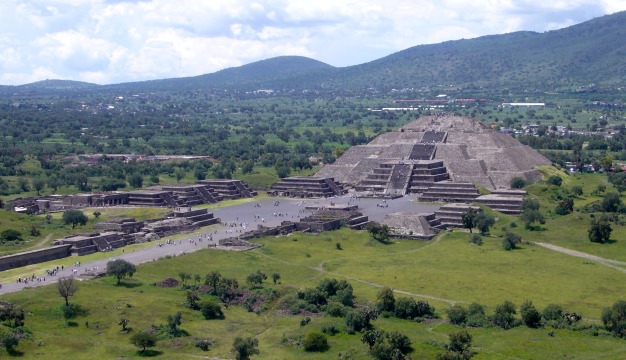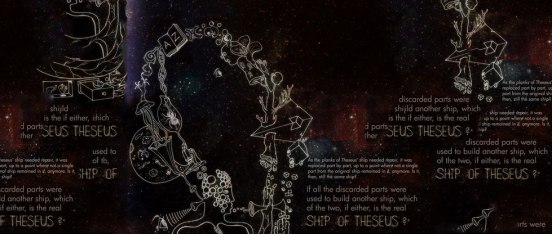“[T]he Catholic Church is the world’s biggest and oldest organization. It has buried all of the greatest empires known to man, from the Romans to the Soviets. It has establishments literally all over the world, touching every area of human endeavor. It’s given us some of the world’s greatest thinkers, from Saint Augustine on down to René Girard. When it does things, it usually has a good reason.”
Power might corrupt the holder, but the greatest testament to its dark capacities is the trail of crippled imaginations found in its shadow.
Only minds whose capacity for speculation has been hobbled could contrive the above argument by Catholic journalists Pascal-Emmanuel Gobry and Michael Brendan Dougherty, and in doing so fail in the following ways:
- not imagining an equally credulous Egyptian in 1050BC making a similarly useless argument for the Oracles.
- not suspecting that influence and superlative endurance throughout Western civilisation’s barbaric and ignorant adolescence might be better explained by a theory that doesn’t predict good reasoning.
It is hardly a surprise that proponents of implicitly ‘might today means right all along’ arguments for Catholicism’s numinous wisdom are often the loudest of European Monarchies’ and Nationalisms’ cheerleaders. Yet Gobry and Dougherty are not to be found amongst them – in this they are inconsistent. Arguments to enduring tradition have a habit of either highlighting hypocrisy or allying you with the ancient darknesses. It is inevitable- the sycophants of any naked emperor who claims to be dressed by that designer of great repute, tradition, daren’t refuse invitation to court by any other.
I am sure the whispers of doubt that modernity brings do not reach the ears of these three outspoken, traditionalist Catholics here. Theirs is a world sealed off from contamination by the secular truths, however well evidenced they may be.
Likewise, if empirically impoverished examples of confirmation bias are your thing, by all means click the link to Gobry and Dougherty’s article above, “Time To Admit It: The Church Has Always Been Right On Birth Control”. But be prepared for the additional morbo of sublimated psychological theatre suggested by their refusing the invitation to pay homage to the other entrenched irrationalities of Western civilisation. They eschew metaphysical argument and adduce (sloppy) observations to validate the Church’s doctrine and prestige. From this appeal to material consequence to demonstrate the righteousness of God’s transcendent will, we know the seal is incomplete. Even the ‘admit it’ of their piece’s title gives us call to suspect that between its lines you intuit an internal conflict between seductive belief and defiant intellect, a cognitive dissonance silenceable in favour of the pre-rational only by publication. Theirs is a topsy-turvy world: belief is felt to be true, the truth can have the spirit of a lie, might is right, publication is vindication.
Of course this is mere armchair psychology, I just simply can’t believe that these writers are this stupid. To offer them the benefit of such doubt we need to remember that self deception is often a work of cunning stealth, and it isn’t easy to say whose fault it is.
Atheism, Abortion, Arrogance, Authority
http://www.patheos.com/blogs/inebriateme/2015/01/the-amazing-incuriosity-of-the-new-atheists/
This is how the fundamentalist mind works: the very act of thinking rigorously is dangerous, because it threatens to expose the gaping void on which the worldview rests. And so even when it would help their cause, the New Atheists are simply incapable of thinking rigorously, or critically, or rationally, because then they would no longer be New Atheists.
-Pascal-Emmanuel Gobry
If one wishes to become speedily acquainted with what Jung meant by projection of the Shadow, debate with these professional Catholic apologists on the topic of Humanist ethics is well recommended.
To minds mired in dogma, if it somehow suggests itself as sassy to frame any non-divinely decreed ethical system as a ‘catechism’, I must wonder if Heliocentricity might have been described as doctrinaire solipsism by their ironic, medieval antecedents on the Monastic equivalents of social media. It’s cutely uncanny, reminiscent of Poe’s Purloined Letter, pinning its intellectual rot in plain sight in the hope its very cynicism is enough to distract from the juvenile nonsense.
While whinging at length about Gobry’s strawman-riddled traducements of ‘New Atheism’ might be satisfying and world-view reaffirming, perhaps it would be more useful to look at the substance of the dismissive posturing with a view to better understanding the cognitive flaws that generate the claims. A curious case study is at hand.
The problem of Abortion derives from how it forces into opposition the indistinct hinterlands of our comprehension and the clear centre of our moral universe; the murky questions of ‘what is human?’, ‘what is life?’ tangling with the self evident right to life and dignity of each human being. This tension between the poles of human concern and competence brings to the surface precisely those flaws which are most inherent in Theologically determined thought and character. Reproduced here are the declarations typical of a committed Catholic:
You might allow that such graceful appreciation of a multifaceted question is not unexpected from the intellectual giant who might actually believe himself when he says
[New Atheists] are people who quite clearly and nakedly want to see religious believers oppressed, and even eradicated.
from here, which in the comments section also features, for bonus Catholic argumentation points, the ‘go and read the other courtiers or you’re but a pleb’ attempt at spellbinding with the aura of publishing- he gives a reading list for admission to the adults’ table- after which he says:
You may not be convinced but at least you’ll have the intellectual scaffolding necessary to participate in this debate productively.
Most thoughtful people, even those tragically bereft of the no-doubt essential ‘intellectual scaffolding’ of Christian apologetics, probably have enough of a foundation in basic thoughtfulness to hold reservations about saying the following, or at least about saying it with an arrogance so acutely misplaced as to be almost inspired
And still, the irony doesn’t quite end there- this is the same lodestar of civilised men who wrote How Our Botched Understanding of ‘Science’ Ruins Everything without actually understanding what this, at times surprisingly insightful (despite its climate change contrarian undertones), piece on Facts -v- Truth entails for his own appeal to empiricism to settle the question of abortion. It essentially means that his obnoxious, blind insistence on a scientific answer, which Kevin Drum describes in Mother Jones as Gobry’s “tawdry rhetorical trick designed to give [his] arguments an authority they haven’t earned”, is yet more mawkish than realised. What unites these appeals to enduring might, reading lists and unqualified scientific certainty? The Catholic belief that eminence is evidence, not what one would expect from this generation’s champion of epistemic humility.
Returning to the twitter exchange, Gobry tags the aforementioned Dougherty into the ring, linking to his piece in The Week which replays the blundering with further, youtubed, sophistry
The science is pretty straightforward about when a human life begins. You can watch visualizations of it on YouTube. After the fusion of sperm and egg, the resulting zygote has unique human DNA
So much for once bemoaning a ‘basic incuriosity […the] sense of a profound lack of reflective ability’.
It’s certainly amusing to see a group which so readily employs metaphysical fudge as a way to undermine the conclusions of rational skepticism later so desperately adopt the cold glare of empiricism. Gobry himself echoes the fallacy:
Whether life begins at conception isn’t a matter of religious faith, it’s a scientific question, and the answer isn’t very hard. Of course, you can choose to disbelieve it, just like you can choose to not to [sic] believe that CO2 molecules redirect infrared variations [sic].
However, as you might have guessed, the point at which our theologians selectively embrace the edifying power of the scientific method is precisely the point at which it is incapable of giving a meaningful answer. Regardless of whether this is an achievement in irony or in self deception, it deserves pause for appreciation.
Gobry is right when he says repeating something doesn’t make it true. The science is not straightforward because the terms of the question asked of it are not clear
Biological theory demands a clear organism concept, but at present biologists cannot agree on one.
–Ellen Clarke The Multiple Realizability of Biological Individuals
But rather than continue to give the New Atheist take on Gobry’s catty schtick of bravura Catholic on ruthless ideological crusade, I’m more interested in exploring how his, and Catholicism’s, conceptual fixedness doesn’t lend itself to the subtlety required for an honest view of the universe and its workings. Insisting without suggestion of delicate reflection that “Facts are stubborn. We know exactly when human life begins” bespeaks a brittle mental schema ill-equipped for understanding the turbulent currents of nature. I hope to examine how such petrified metaphysics underwrite the workings of self deception among the modern faithful and thus let the indoctrinated somewhat off the hook. Convicting the real culprit requires us to collect evidence on his false testimony against nature, to find him we need to look deep into our intellectual history.
Life Jim…
David L. Hull in A Matter of Individuality
The distinction between an organism and a colony is not sharp. If an organism is the “total product of the development of the impregnated embryo,” then as far back as 1899, T. H. Huxley was forced to conclude that the medusa set free from a hydrozoan” are as much organs of the latter, as the multitudinous pinnules of a Comatula, with their genital glands, are organs of the Echinoderm. Morphologically, therefore, the equivalent of the individual Comatula is the Hydrozoic stock and all the Medusae which proceed from it”. […] According to evolutionists, units of selection, whether they be single genes, chromosomes, organisms, colonies or kinship groups are individuals.
We also have Wilson, Robert A. and Barker, Matthew, “The Biological Notion of Individual”
[I]t proves surprisingly difficult to specify what it is to be an organism[…]
In the early 1990s, a team of biologists reported in the journal Nature that they had found high levels of genetic identity in samples of a species of fungus (Armillaris bulbosa), which had taken over a large geographic region in Michigan’s Upper Peninsula (J. Wilson 1999: 23–25). They used these data to make a case for viewing these samples as constituting parts of one gigantic fungus, with an estimated biomass of more than ten tons and an estimated age exceeding 1500 years. They concluded, “members of the fungal kingdom should now be recognized as among the oldest and largest organisms on earth” (Smith, Bruhn, and Anderson 1992: 431). A number of other scientists have questioned whether this final claim about the organismal status of the humungous fungus is warranted, and some have argued the claim is mistaken.
[…]
Consider a second example in more detail (Turner 2000: ch.2). Coral reefs, despite rapidly becoming a thing of the past due to the climate changes associated with global warming, are spectacular and beautiful parts of the living world. They consist of two chief components. The first are accretions of calcite deposits. The second are the small animals, polyps, which produce and grow on the deposits. (Coral polyps belong to the same Linnaean class as sea anemones, and to the same Linnaean phylum as jellyfish.) The polyps are indisputably organisms. But further, conservation biologists also often describe the coral reefs, consisting of the polyps and deposits, as living things that can grow and die.
[Edit: this article does a better job at making my point clear.]
If this appears obscurantist, that will be because Nature doesn’t have to play along with our notions of what is clear and satisfactory. We demand categorical answers to categorical questions yet Nature herself transcends such pigeonholing. The obscurantist tendency resides precisely in this prejudiced Procrustean bed of categorical schema on whose terms we demand explanation.
Conceptually, this question of metaphysical category appears to me a hugely interesting and relevant one regarding much debate on traditional Progressive -v- Conservative issues. A recent New Yorker article on the Churchlands, Philosophers of science at the University of California at San Diego, briefly raised this schematic problem in the context of exploring the relationship between thought and the physical brain.
How probable was it, after all, that, in probing the brain, scientists would come across little clusters of “belief” neurons? It wasn’t that beliefs didn’t exist; it was just that it seemed highly improbable that the first speakers of the English language, many hundreds of years ago, should miraculously have chanced upon the categories that, as the saying goes, carved nature at its joints. It might turn out, for instance, that it would make more sense, brain-wise, to group “beliefs about cheese” with “fear of cheese” and “craving for dairy” rather than with “beliefs about life after death.”
Mental life was something we knew very little about, and when something was imperfectly understood it was quite likely that we would define its structure imperfectly, too. It was only rarely that, in science, you started with a perfectly delimited thing and set out to investigate it; more often, your definition of what it was that you were looking at would change as you discovered more about it.
‘Carving nature at its joints’ is a very useful description of the work of pure Mathematicians. While the disjunct mathematical concepts that are the numbers can be said to come to us through the logical fabric of reality itself, insisting similar discrete, natural kinds or essential Forms inhere in the world studied by biologists is folly. The science which strives to delineate the joints in the living world is less apprehension of essence, more a compilation of methodological convenience and nominalist convention.
Stamp Collecting, Not Letter Writing
All science is either physics or stamp collecting.
-Ernest Rutherford (winner of nobel prize for a science that is not stamp collecting)
The father of modern philosophy of science, Karl Popper, in a 1945 essay Two Kinds of Definition addressed with great insight and clarity the Essence vs ‘Stamp Collecting’ confusion.
the scientific view of the definition ‘A puppy is a young dog’ would be that it is an answer to the question ‘What shall we call a young dog?’ rather than an answer to the question ‘What is a puppy?’
This quote goes to the very quick of the distinction between bewitchment and teaching. Scientific definitions explain the collection of terms used to prevent us repeating the likes of ‘a young dog’. Aristotelian definitions, on the other hand, were themselves considered the source of knowledge (a puppy is small, has four legs, is cute), the truth values of such, it was argued, could be obtained by comparing the definition against what is apprehended by intellectual intuition. Popper maintains Aristotle’s insistence on ‘basic premises’, these intuited essences, has polluted the intellectual ecosystem of Western Civilisation since its inception. It is the Greek giant who has preordained a millennium of Catholic distortion.
Aristotle taught that in a definition we have first pointed to the essence – perhaps by naming it – and that we then describe it with the help of the defining formula; just as in an ordinary sentence like ‘This puppy is brown’, we first point to a certain thing by saying ‘this puppy’, and then describe it as ‘brown’. And he taught that by thus describing the essence to which the term points which is to be defined, we determine or explain the meaning of the term also.
This problem, has very real repercussions for those who would look to science to augment the field of ontology. It is an absurdity to assume a discrete ‘it’, ie. intuit an essence ( the puppy, a human life, fire) and then to ask what it is scientifically ie. to delineate it in a manner matching with our intuition.
“Consider the medieval physicists who wondered what fire could be,” Pat [Churchland] says. “They identified a range of things that they thought were instances of fire: burning wood, the sun, comets, lightning, fireflies, northern lights. They couldn’t give a definition, but they could give examples that they agreed upon. Jump now to the twentieth century. The category of fire, as defined by what seemed to be intuitively obvious members of the category, has become completely unstuck. Turns out that burning wood is actually oxidation; what happens on the sun has nothing to do with that, it’s nuclear fusion; lightning is thermal emission; fireflies are biophosphorescence; northern lights are spectral emission.”
Popper continues
[E]ssentialism not only encouraged verbalism, but it also led to the disillusionment with argument, that is, with reason. Scholasticism and mysticism and despair in reason, these are the unavoidable results of the essentialism of Plato and Aristotle.
ahem.
In both Dougherty’s and Gobry’s pieces, this despair with, or perhaps even disdain for, reason is omnipresent. But, to be fair Doherty at least came close…
Biology doesn’t really give us options for when an individual life begins, at least none that we could deny without also denying our ability to know whether any individual members of a species “really exist.”
…before retreating to the ‘really exist’ essentialist fox hole.
Biology doesn’t give us options because it’s not a question of or for science, this is due to un-scientifically assuming that life, a non-scientific concept, has an essential beginning which is not also the beginning of the universe. Such a beginning is, again, not a scientific Truth but a nominalist convenience. Popper reminds us:
Questions like ‘What is life?’ or ‘What is gravity?’ do not play any role in science.
To the question of when a human life begins, we need to respond by asking what are we a priori calling ‘a’ human life, what have we named? If we begin by saying ‘that which begins at the fusion of human sperm and egg’, then we have begged the question. Yes, the concept of human individuality is certainly an intuitive necessity and a conceptual convenience, but identifying the limits of ‘being’ is not so clear cut.
With the creation of ‘unique human DNA in a zygote’ we certainly have a ‘developmental bottleneck’ in the evolutionary continuum of the species, but is this truly the only criteria for determining the origins of being? Given the other perspectives on biological individuality as discussed above, ranging from species to individual genes, some even requiring the presence of an immune system for consideration as a mulitcellular orgainsm (present after 9 weeks of foetal gestation if you are curious), we must go further.
A useful way to consider the problem is to accept there are varieties of individuality in the biological world. Austin Greeley Booth argues for the recognition of two classes: Evolutionary Individuals and Organism Individuals.
The first cateogry may be described (though there are competing descriptions)-
A Darwinian individual is, “any member of a Darwinian population” […] Darwinian individuals can be
entities at any level of the biological hierarchy, so long as they are in principle capable of reproduction. The Darwinian individual category understood in this way includes genes, organelles, cells, organisms, collectives of certain kinds, and perhaps even species.
while the second
One strategy for characterizing the nature of organismality is to suggest that organisms exhibit
special kinds of functional integration. For example, organisms may be regarded as essentially
metabolically homeostatic and autonomous entities. Organisms are entities that take in nutrients and
other sources of energy from outside themselves, that maintain their metabolic integrity in the face
of fluctuating external conditions, that have parts that work toward the operation of the whole, and
that exhibit some threshold of biotic independence […].
This framework has implications for our ‘straightforward science’. While a zygote is, notionally, a Darwinian individual, exactly like a single gene, it cannot yet be said to be an Organism Individual.
[O]rganisms differ from both complex non-living natural systems and from parts of living systems. Proximal, mechanistic biological theories and explanations make reference to various kinds of biological individuals, like organs, genes, T cells, or developmental modules. None of these individuals is capable of autonomous persistence, however. These individuals must be embedded in a larger system (an organism-like system) to perform their appropriate functional role. So though entities like organs or subsystems can be viewed as biological individuals, they can be helpfully distinguished from organism-individuals.
We are back to the question of human individuality. Human life at fertilisation stage can be described by reference to one type of Individuality, but not as an organism and certainly not as a person. So what of this individuality?
This puzzle of how to reconcile individuality with existence and its origins can be usefully explored by running the Ship of Theseus paradox both forwards and in reverse. While wondering if, having incrementally replaced each component, the ship remains ‘itself’, we can also ask at which point in its developmental history do we say it came into being?
For the first question it is interesting to observe how we allow our intuition to inform us that the individuality of the thoroughly refurbished ship remains un-ruptured yet we must also contend with the reality that it is clearly a different entity. As such, can individuality per se really be the key to unlocking the definition of being?
Running the Ship of Theseus experiment backwards we encounter a similar problem. ‘Upon completion’ feels a dogmatically rigid answer to the question of when we can first intuit the ship’s existence. If we loosen up but still insist that our answer accord with the onset of a spatial bounding we are left with a mound of building materials being referred to as a ship. If we turn then to the emergence of its constituent parts? Perhaps further back at the generation of ideas by its brainstorming naval architects? Would we need to return to the very first ship? The very first hewn timber and forged nail? The development of smithing, the first tree?
“If you wish to make an apple pie from scratch, you must first invent the universe.” Carl Sagan
Of course we don’t speak like this when in the kitchen and this is exactly Popper’s point re scientific definitions. They merely facilitate the understanding of the recipe; invoking the big bang each time you wish to bake is probably cumbersome. There is no argument that such convenience is a basis for ontological Truth
[L]egal personhood should have a relationship to when we know a new individual of the species comes into existence.
Individuals do not one moment ‘come suddenly into existence’. Existence reconfigures itself and we usefully call that particular, most basic permutation which can explain (via prediction) nature’s workings an ‘individual’. Levels of organisation which correspond with certain workings can be identified – if it floats and can be maneuvered, Theseus’ wood and nail structure can be called a Ship. But in the natural world there are various workings: evolutionary, organismal, psychological, and so, as we’ve seen, various individualities. Deciding that life is toggled ‘on’ with the first speaking of ‘individuality’, as if the whole origin of being is identical to the onset of ‘singularity’, as if a gamete is less not-an-organism than a zygote, as if the phrase “Theseus’s ship” can be applied to a structure with a cabin but no hull, is nonsense of the sort described by Popper 70 years ago.
The development of thought since Aristotle could, I think, be summed up by saying that every discipline, as long as it used the Aristotelian method of definition, has remained arrested in a state of empty verbiage and barren scholasticism, and that the degree to which the various sciences have been able to make any progress depended on the degree to which they have been able to get rid of this essentialist method.
Richard Dawkins sees this verbiage and scholasticism made lifeless by its insistence on discrete, essential categories, describing those whose thought is conditioned by it as suffering under ‘the tyranny of the discontinuous mind‘ (its implications for gay marriage is something I’ve also written about)
For purposes of legal clarity, just as the eighteenth birthday is defined as the moment of getting the vote, it may be necessary to draw a line at some arbitrary moment in embryonic development after which abortion is prohibited. But personhood doesn’t spring into existence at any one moment: it matures gradually, and it goes on maturing through childhood and beyond.
To the discontinuous mind, an entity either is a person or is not. The discontinuous mind cannot grasp the idea of half a person, or three quarters of a person. Some absolutists go right back to conception as the moment when the person comes into existence – the instant the soul is injected – so all abortion is murder by definition […] [a] belief that … is puerile and ignorant.
To sum up, either
1) the Ship of Theseus was spread across the forests and mines of the world and before that among the depths of the stars, an acorn is a tree, ‘a hurricane [is] the barely perceptible zephyr that seeds it’ and ‘abortions’ are occurring on the scale of billions each second by all the male masturbation ongoing and the potential sex that is not had,
or
2) magical, Nuomenal Essentialism is the fabric of being, evolution isn’t true; a non-giraffe one day gave birth to a giraffe on the plains of Africa millions of years ago and new human beings become suddenly present at conception- making all abortion murder,
or
3) our language and traditions have lead us to an essentialist metaphysics which corrupts out thinking, meaning 1) is true on a material level but not consistent with a way our language might practically frame the concepts. Thus it might most usefully be argued that personhood, while a gradual dawning, doesn’t occur at the midnight of conception but when we perceive the first rays of awareness.
I’m not sure that Gobry’s (or to a lesser extent Dougherty’s) “participation in the debate” has provided us anything that was not “aggressively, imperiously banal” (as @eliasisquith wonderfully put it). It is worthy of some amazement that clearly intelligent people, paid to think on these issues, can expend such energy shoring up trite short-circuits of reason with snorts of hostility and ignorance. However, it is worth remembering Orwell’s greatest insight: tyranny is first the control of the schema of thought: language, metaphysics. Snared in Aristotelian Essentialism, the truculent Catholic attempt to insist on the blue pill (or is that the green pill?), the One True Schema is, essentially, the policing of metaphysical thought crime with the implicit threat of excommunication from the debate.
Self deception is easy if the truth is in a language they pay you not to hear.
Now read this too
The Categories Were Made For Man, Not Man For The Categories
And






